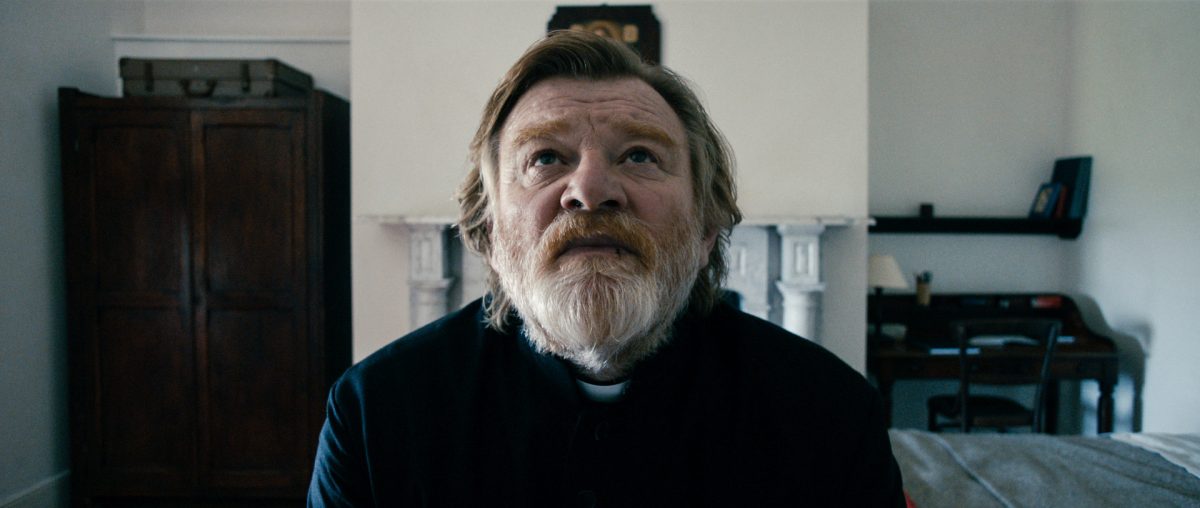
Warning: The following review contains spoilers. (But fear not, I don’t give away the ending! That would be crazy-talk.)
In Calvary, Brendan Gleeson demands your attention. His bearded face is wide and expressive. His voice, calm and focused, draws you in. Playing a Catholic priest in a small, coastal Irish village, he fills out the old-fashioned cassock he wears with a barrel chest and an ample gut. His presence, and his outsized acting ability, are almost enough to save Calvary from feeling like a glorified theology project—almost.
When we first meet Gleeson’s Father James he is receiving confession from a bitter and disturbed man, who we don’t see. The man is recounting his horrific childhood sexual abuse at the hands of a priest, now dead. There is no justice for this man, no chance for retribution. His revenge for being abused by a bad priest? To kill a good one, he says. “I’m going to kill you, Father,” he reports, matter-of-factly. Then he tells Father James he’ll give him a week to get his affairs in order and that he should meet him on the shore the following Sunday so he can do the deed.
We watch Father James’ face during this confession and it’s surprisingly stoic. He seems nonplussed more than scared. He doesn’t jump out of the confessional to face this man, nor does he confront him later (he tells a bishop that he recognized the man’s voice, which makes sense—this is a very small town). He doesn’t go to the police. He doesn’t leave town, although he briefly considers it. In fact, he takes this threat as a kind of fait accompli—going about his business being a good priest, with every intention of meeting his murderer.
But…why?
The natural assumption is that James is martyring himself for the sins committed by the Catholic Church. But the film makes a point of debunking that theory. In fact, I never got a satisfactory explanation for James’s improbable behavior, except for when he says that, for most people, faith comes merely from a fear of death. His own faith is truer, more deeply felt. Not fearing death is not quite the same as agreeing to be murdered, though.
Here’s another reason why James might be so resigned to his fate. Because, despite Gleeson’s best efforts, he’s a symbol, not a man. His behavior is not the behavior of a real person, but of the embodiment of faith itself. Except for one scene where he gets drunk and completely loses it at the town bar, he is the soul of forgiveness, temperance, scholarship, and asceticism. (He lives in a completely spartan room, with a cross, a bible, a mattress, and his aging Labrador retriever.)
Calvary is told as a countdown to the day of Father James’s intended murder. In that sense, the film doesn’t just have a sense of foreboding: it’s all foreboding. However, the good priest continues to counsel his parishioners, business as usual.
Those parishioners include a wealthy man (Dylan Moran) whose wife and children left him and who boastfully brandishes the gaudy price tag of every item he owns; an adulterous woman who flaunts her sins in front of the Father; her husband (Chris O’Dowd), a hard-drinking butcher having a crisis of faith; an atheist doctor (Aiden Gillen) who gleefully shares depressing medical stories to challenge the Father’s faith; a recently widowed woman who takes her husband’s death with graceful equanimity; a gay cop and his aging boytoy, who speaks, bizarrely, like an extra from a high school production of Guys and Dolls. And I haven’t even mentioned Father James’s grown daughter (Kelly Reilly), who arrives in town with telltale scars on her wrists. (James was married before he joined the priesthood.)
So much pain and suffering in one small town! So many different philosophies of life and death! All so articulately expressed!
Yes, I understand you are more likely to open up to a priest about morality and sin than you are to, say, a computer salesman, but people don’t generally lay out their life philosophies in daily conversation, nor do they always behave in such a way as to fully illustrate their “type.”
Filmmaker John Michael McDonagh (The Guard), working from his own script, has ideas—and lots of them. He also has a way with a turn of phrase and a nifty dark sense of humor, particularly in the scenes between Father James and an aging writer (M Emmet Walsh), who wants to procure a gun so he can kill himself, when the time is right. What he’s lacking, to me at least, are multi-dimensional characters who seem to have a life beyond the film’s thesis. Calvary is actually worth seeing because of Gleeson. But the film’s lead actor shouldn’t have to do that much of the work for you.
